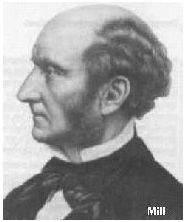Utilitarianism
This philosophical movement emerged, as we mentioned previously, in England simultaneously with Positivism in France.
It is defined as: Social Positivism through which the theoretical theses of philosophy or morality are considered to be instruments of social renewal or reform.
The most important representatives of classical 'political economy' are Thomas Robert Malthus (1766-1834) and David Ricardo (1772-1823), a great influence in Marxism, as well as Jeremy Bentham (1748-1832), who intended to transform morality into an exact science.

OHN STUART MILL (1806-1873)
Logic: According to Mill, this science attempts to refer every truth, principle or demonstration to empiric bases:
- Eliminating any non-empirical fundament of universal truths and principles.
As expected, Mill draws some conclusions which are similar to 'Empiricism':
- The so-called ‘essential proposals’ are purely verbal.
- The problem with INDUCTION (which refers to the 'uniformity of Nature' and it takes us to the LAW OF COINCIDENCE).
The Science of man: Mill considers the creation of a 'science of man' to be a philosophical necessity. Man needs to be studied as precisely as we study the problems found in Nature. We need to be able to deduct the future behaviour of a person we know well:
- ETHOLOGY (science which studies the laws that 'form the character'.
- SOCIOLOGY (science which studies the 'progress of human kind')
This last one, 'sociology', corresponds to Comte's 'Social Physics'.